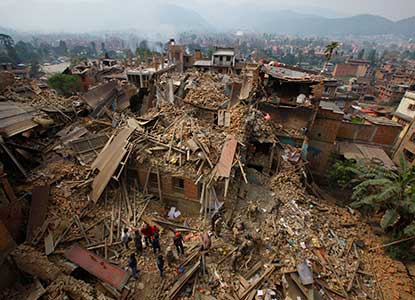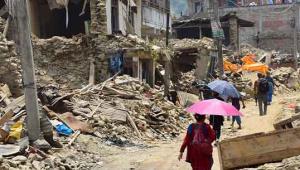The Nepalese government announced it had signed an agreement with the EU yesterday for the funds, which will be used to build the financial and implementation capacity of Nepal’s government as earthquake reconstruction and recovery continues to lag behind.
The UK government has also announced it will match public donations to disability charity Handicap International’s appeal to help thousands of people across the country left injured or disabled as a result of the 7.8 magnitude earthquake that caused widespread destruction and killed up to 9,000.
Britain has already pledged £70m towards reconstruction which, along with donors including the US, EU and World Bank, goes towards a total of $4.1bn pledged to Nepal by the international community.
But exactly one year on from the earthquake, no houses have been rebuilt and the country’s National Reconstruction Authority has only just become operational, making use of just $700m so far.
Both the Red Cross and Oxfam recently expressed concerns that millions of Nepalese people are still sleeping out in the open, in makeshift campsites or temporary shelters, where it looks like they will endure another monsoon season exposed to the elements.
Cecilia Keizer, Oxfam country director, said it is “unacceptable” that reconstruction is being delayed by powerful interests raising disputes around land ownership and usage.
Before the earthquake, around 4% of Nepal’s population owned 40% of the land while 65% of farmers owned just 15%. Oxfam said it was concerned that this skewed distribution of land is not being corrected and that the government’s reconstruction support is dependent on claimants holding certificates of land ownership.
A report published by the anti-poverty NGO last week found that the poorest and other marginalised groups are being excluded from the reconstruction process, which could result in a more unequal society than before.
The government’s promise to give every family that lost a home $2,000 towards rebuilding has gone largely unfulfilled.
While the reconstruction effort has been dogged by corruption, political bickering and upheaval have been the major causes of delay.
Instead of focusing on rebuilding efforts, in the months following the earthquake the Nepalese government focused on rewriting the constitution. They hoped to fast track this, which they thought would in turn speed up reconstruction.
But the move, which saw the nation become a secular republic divided into seven federal provinces, involved much political wrangling and was controversial, sparking outrage among ethnic groups that saw it as discriminatory.
Protestors set up blockings on crossings into Nepal along the Indian border. This lasted for four months, leading to severe shortages of fuel, food, aid and other supplies.
“We are hoping that the government’s priorities and perspectives on reconstruction will soon be clear so that we can help people to rebuild and get their lives back as quickly as possible,” said Max Santer, head of the Nepal country office for the International Federation of Red Cross and Red Crescent Societies.













